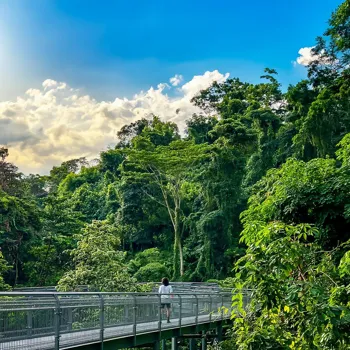Unlock Sustainable Travel: 8 Tips for Eco-Conscious Explorers! Dive into eco-tourism and make a positive impact on your adventures
Namaste, globe-trotters! Planning a holiday? That’s fabulous! But before
you book that flight and pack your bags, let's talk about something super important: travelling sustainably. We all love exploring our beautiful planet, but it's crucial we do so in a way that doesn't harm it.
Sustainable travel, or eco-tourism, is all about minimizing your impact on the environment and the local communities you visit. Think of it as being a responsible guest in Mother Nature's home. It’s not just a trend; it's a responsibility.
So, let's dive right in and explore eight practical tips that will help you become an eco-conscious traveler and make a positive difference on your next adventure. Get ready to explore the world with a lighter footprint!
Choose eco-friendly transport options to reduce carbon footprint
First things first, transportation plays a major role in your carbon footprint. Consider opting for slower modes of transport. Instead of flying directly to your destination, explore the option of trains or buses, especially for shorter distances.

These are generally more eco-friendly than airplanes. If flying is unavoidable, try to book direct flights. Direct flights consume less fuel compared to flights with layovers.
Once you reach your destination, ditch those cabs whenever you can and make use of public transport, rent a bicycle, or simply enjoy a walk.
Walking and cycling are not only fantastic for the environment but also offer a great way to explore your surroundings and discover hidden gems you might otherwise miss. Remember, every small effort counts towards reducing your carbon footprint. Embrace the journey and enjoy the scenic route!
Choose eco-friendly stays for sustainable travel
Next up, let's talk about accommodation. Where you stay matters. Look for eco-friendly hotels or guesthouses that are committed to sustainable practices. These establishments often have initiatives like energy conservation, water reduction, waste management, and support for local communities.

Before booking, check their website or ask about their sustainability policies. Do they use solar power? Do they recycle? Do they support local artisans? Another great option is to stay in locally owned bed and breakfasts or homestays.
This not only reduces your environmental impact but also provides a more authentic cultural experience by directly supporting the local economy. Plus, you’ll often get insider tips on the best places to visit and things to do from your hosts.
Choose your accommodation wisely, and you'll be contributing to a more sustainable tourism industry.
Packing smart for sustainable travel reduces environmental impact
Packing smart is another key aspect of sustainable travel. Before you start throwing everything into your suitcase, think about what you really need. Overpacking leads to heavier luggage, which in turn increases fuel consumption during transportation. Create a packing list and stick to it.
Choose lightweight and versatile clothing items that can be mixed and matched. Pack reef-safe sunscreen, reusable water bottles, shopping bags, and toiletries in solid form to reduce plastic waste.
Consider packing a small first-aid kit with essential medications to avoid purchasing them in single-use packaging while traveling. By packing thoughtfully, you can lighten your load and reduce your impact on the environment along the way.
Remember, less is more when it comes to sustainable packing.
Support local businesses when traveling for sustainable tourism
Support local businesses and communities. When you travel, make a conscious effort to buy local products and services. Avoid large chain stores and restaurants that may not prioritize sustainability. Instead, visit local markets, artisan shops, and family-run eateries.

This not only helps boost the local economy but also provides an opportunity to experience the authentic culture of the place you are visiting. Engage with local communities respectfully and learn about their traditions and customs.
Supporting local businesses ensures that your money directly benefits the people who live in the area, fostering a more sustainable and equitable tourism model. Remember, your travel dollars can make a big difference in the lives of local people. Be a responsible and respectful consumer.
Reduce waste, recycle, avoid plastics, carry reusable items, follow local waste practices
Be mindful of your waste. Reduce, reuse, and recycle wherever possible. Avoid single-use plastics like water bottles, straws, and plastic bags. Carry your own reusable water bottle and refill it whenever you can. Use reusable shopping bags when you go to the market.
Say no to plastic straws and opt for alternatives like bamboo or metal straws. Properly dispose of your waste and recycle whenever facilities are available. Be aware of local waste management practices and follow them diligently.
If you are visiting a place where recycling is not common, consider carrying your recyclable waste back with you. By minimizing your waste, you can help protect the environment and keep our planet clean and beautiful for future generations. Waste management is everyone's responsibility.
Respect local cultures and environments while traveling for positive impact
Finally, respect local cultures and environments. Before you travel to a new place, take the time to learn about its culture, customs, and traditions. Dress modestly and behave respectfully in religious sites. Avoid taking photographs of people without their permission.

Be mindful of local environmental regulations and avoid disturbing wildlife or damaging natural habitats. Do not litter or vandalize any property. Support local conservation efforts and participate in eco-tourism activities that promote environmental protection.
By respecting local cultures and environments, you can ensure that your visit is both enriching and sustainable, leaving a positive impact on the places you visit. Remember, you are a guest in their home; treat it with respect and care.




















